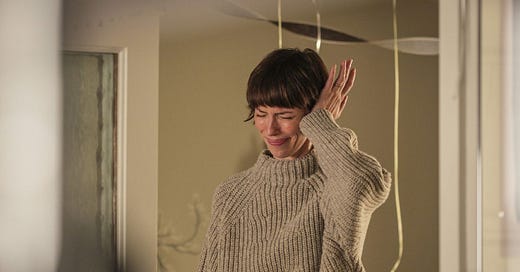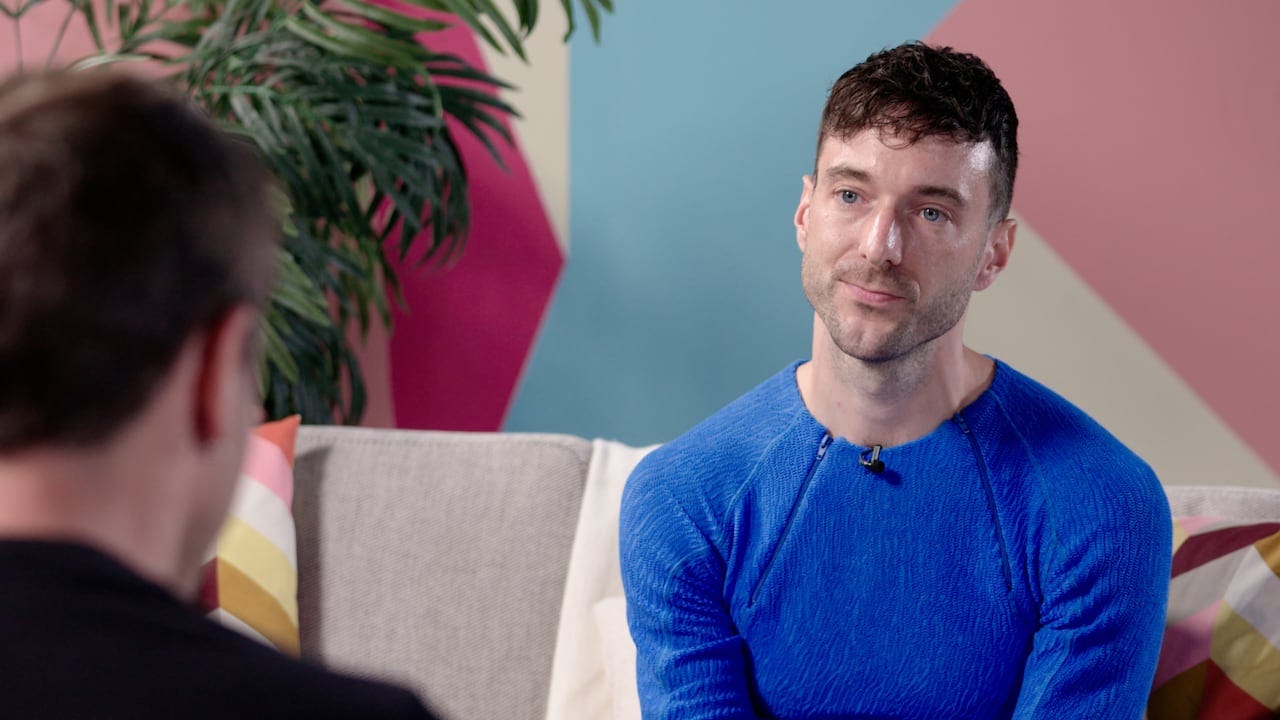With year-end duties done, I’ll continue this week playing your TV Sommelier, bringing you more rounds of TV picks along with recommended “pairings” for complementary cultural imbibement. Today, it’s Jordan Tannahill’s The Listeners, on the BBC. (I assume it will get picked up here in future, but for now watching it in North America requires grey-market machinations.)
Main course
This gripping four-part UK drama is based on Canadian writer and stage director Tannahill’s 2021 novel of the same name; he also wrote and executive produced. The story is about a woman who begins hearing “The Hum,” a mysterious low-frequency sound that handfuls of real people in various places around the world believe they’ve heard—including for a time in Windsor, Ont. For the suburban teacher mesmerisingly played here by Rebecca Hall, the Hum soon starts pulling her life apart.
It’s reminiscent of Todd Haynes’ classic Safe as a tale about experiencing a health condition nobody else believes in, rightly or wrongly, and how it can exile the sufferer to a different reality. But it extends into other social and psychosexual zones, as Hall’s reactions to her condition estrange and entangle her, drawing viewers (slash listeners) along in her thrall. The score by Dev Hynes (Blood Orange) balances carefully between suggesting interwoven drones and never seeming like it is trying to illustrate the Hum itself. Likewise we’re often left to decide what’s literal among the events on screen, and which are wraiths conjured by fear and desire.
I may be biased here (though the Guardian and others seem to agree), as Jordan Tannahill is an old friend. He directed me as part of the All Our Happy Days Are Stupid ensemble in stage productions in Toronto and New York in 2013 and 2015.
That happened first and best at his former, beloved Kensington Market space Videofag; you can hear Jordan talk about how his experiences there shaped his current work, and discuss The Listeners as well, in the CBC’s Here and Queer series. Also let’s congratulate him on his recent wedding to actor Brandon Flynn (covered in Vogue, oh my!), as well as his upcoming off-Broadway show Prince Faggot. All of which is only what we expected a decade ago, with his talent and charisma, and an approach to the creative process so light on neurosis it’s downright un-Canadian.
Recommended pairings
As if a book and series weren’t enough, The Listeners is also now an opera (!) by acclaimed U.S. composer Missy Mazzoli, which premiered in Philadelphia in October and prompted this rave review by Alex Ross in The New Yorker. But the idea of people having to adjust to an uncontrollable background sound also put me in mind of questions raised by John Cage—such as, what is good versus bad sound, or “music” versus “noise,” and how does it relate to perception, subjectivity and the natural world? What would happen if the sufferers of “the Hum” chose to hear it as music instead of noise?
(The story later also broaches Pauline Oliveros territory, but that way lie spoilers.)
More fancifully, what if instead of a psychosomatic symptom or industrial-environment or electromagnetic byproduct, somehow these characters were hearing the current ongoing German “performance” of Cage’s 1980s composition ORGAN2/ASLSP (As Slow As Possible)? The piece consists of extremely slowly changing chords, and has been in progress on a church organ in Halberstadt since 2001. Theoretically it will continue until 2640, or 639 years altogether. (Roughly the length of time now since Chaucer died. ) The latest chord change was in February and the next will be in August of 2026.
If you’re saying to yourself, “What kind of conceptual bullshit is that?” you may be reading the wrong newsletter. But also, look at this Harper’s Magazine essay by John Darnielle (yes, from the Mountain Goats). (If the article link doesn’t work, try here.) Published in 2016, “There Are Other Forces at Work” is about John’s experience visiting Halberstadt to witness one of the chord changes.
In the off-season, the church is open only from noon till four. That’s twenty hours each day of a performance with no audience. Not only will nobody ever see the entire performance of ORGAN²/ASLSP, or even a notable fraction of it—most of the people who hear it at all will hear the parts that are least typical, i.e., the note changes. The actual performance can only be guessed at, gleaned, inferred. I logged at least five hours in the church over the course of a week. In those hours I felt like I was getting a sense of it, but (24 x 365 x 639) / 5 = 1,119,528. I went over to Germany, and I saw one millionth of a performance of a piece of music.
Inside St. Burchardi the plaques on the walls say: we were here; we heard it. Our numbers stretched across the centuries. Our congregation is vast. It hears nothing. The audience for this performance, reckoned at its conclusion, will consist mainly of the dead.
John-D.-on-John-C. suggests further ways to decipher The LIsteners: Were you compelled to be a perpetual audience for ORGAN²/ASLSP in your mind’s ear, would it render you a kind of Hum-infected, zombie listener, midway between life and death? (See also Pontypool, the book by Tony Burgess or the film by Bruce McDonald.) Or perhaps, as some of the characters here fantasize, it would mean you are more alive, with your sensitivity to perceive a Hum others don’t—or the toxic chemicals in every household, or the Morgellons fibers beneath your skin. Perhaps the Hum is mortality itself. Cage’s surely is. Or at least it defies us to imagine that in six hundred years there will be someone left to hear how it ends.
Bonus pairing: Hear a very young Jordan Tannahill talk about Bravislovia, the country he made up as a child, in his 2007 lecture for Trampoline Hall.







I saw the first two episodes of The Listeners at TIFF, as part of their “cool tv” programme, and loved it, so I read the book immediately after the festival. I loved the book too (although I had maybe some misplaced expectations about how certain plot points would resolve and was a tiny bit disappointed about some aspects, but I’m not sure that’s the book’s fault?). Looking forward to finishing the series. And I have to hear that T-Hall lecture, because I too made up a country in childhood. The portal to it was behind my bed and I visited it often.